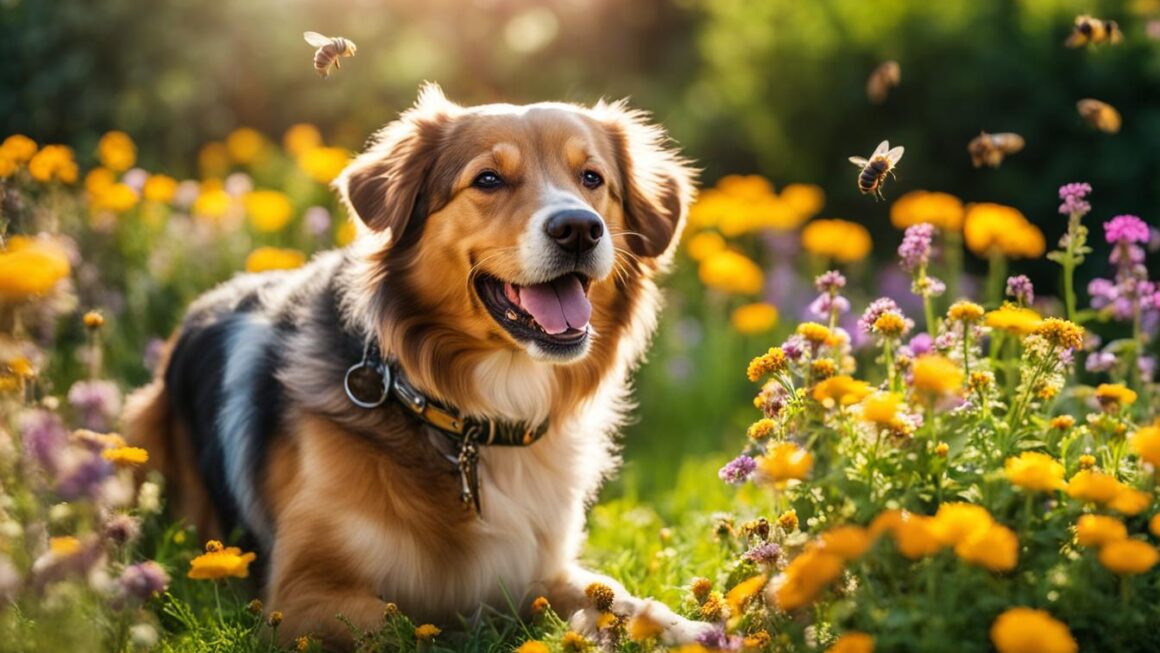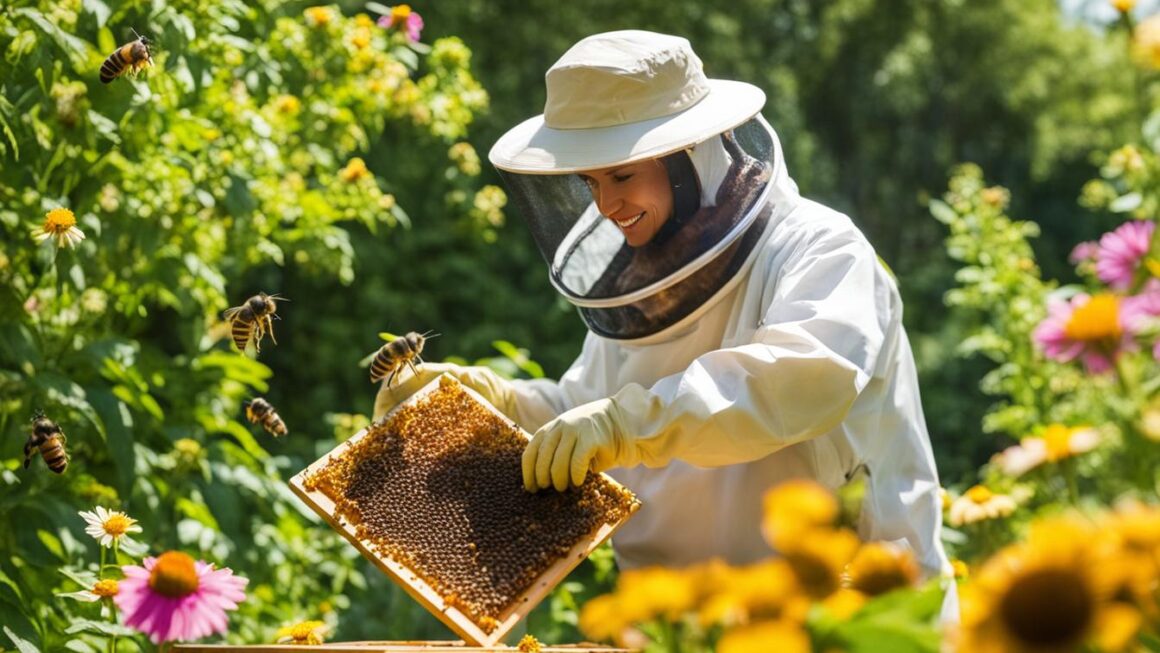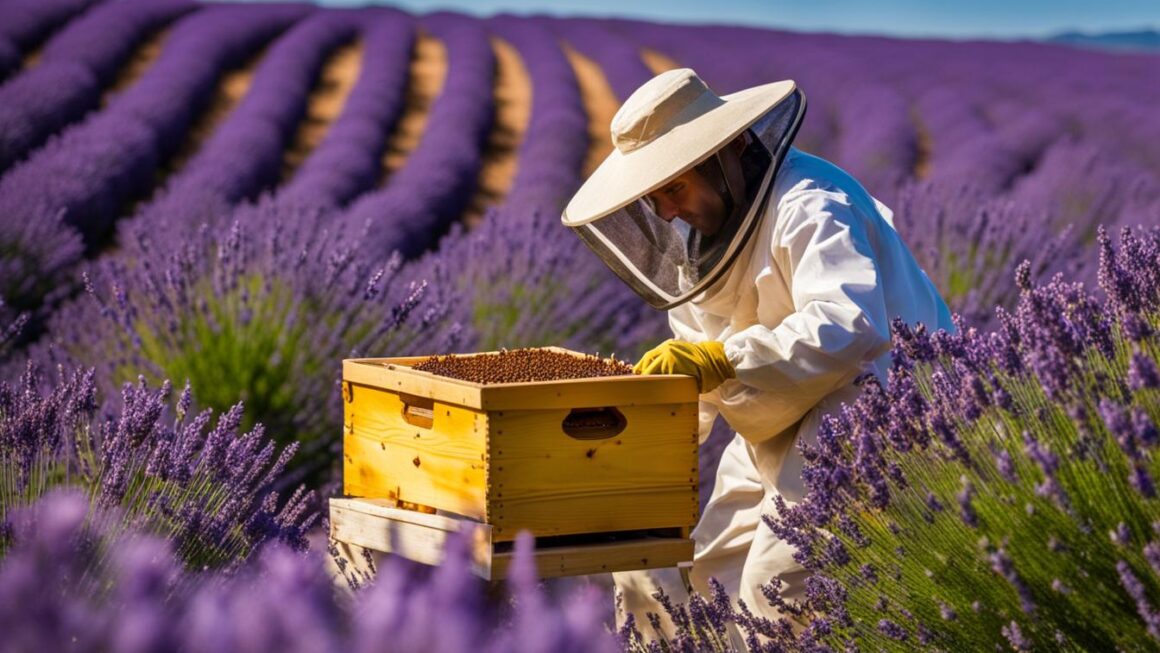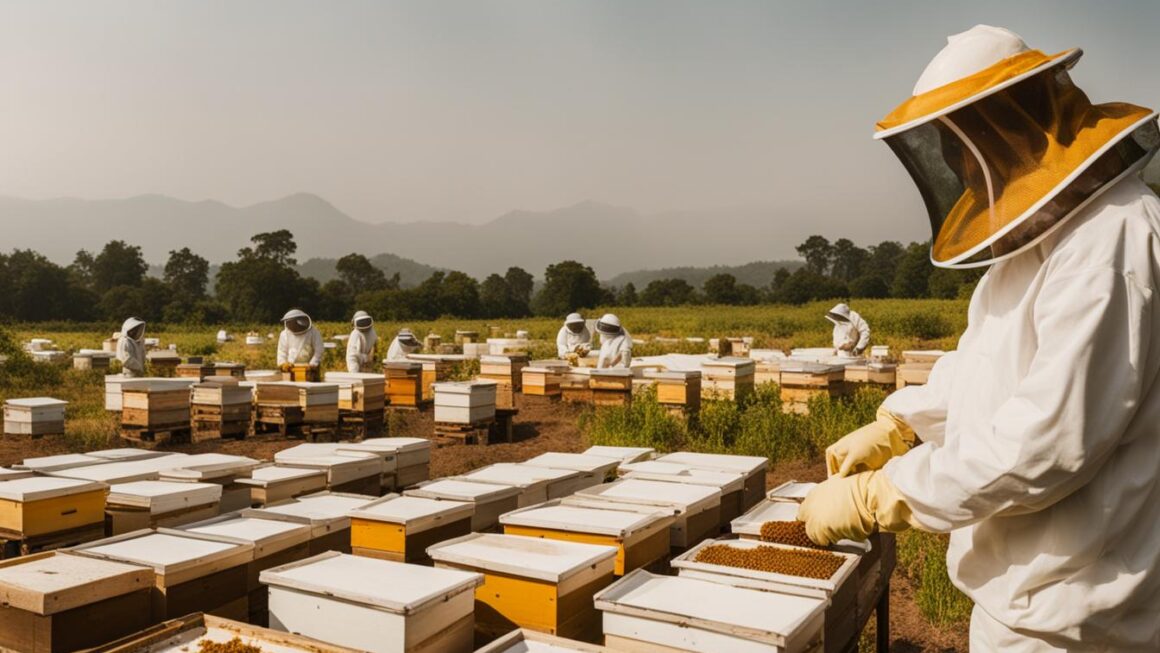Bee pollen is a natural supplement that has gained popularity for its potential health benefits in humans. But what about our furry friends? Can dogs safely consume bee pollen? Let’s explore the benefits of bee pollen for dogs and how to safely incorporate it into their diet.
Key Takeaways:
- Bee pollen can be safely consumed by dogs and offers numerous health benefits.
- It supports energy, digestion, immunity, and overall health in dogs.
- Start with a small dose and gradually increase while monitoring for adverse reactions.
- Source high-quality, toxin-free bee pollen for your dog.
- Bee pollen should complement a balanced diet and veterinary care, not replace them.
What is Bee Pollen?
Bee pollen is a natural substance produced by honeybees. It is a mixture of pollen, nectar, and bee saliva. Worker bees collect pollen from flowering plants and carry it back to the hive on their hind legs. Once back at the hive, the bees use the pollen to feed the colony, including the queen bee and the larvae.
Bee pollen is often referred to as nature’s superfood because of its impressive nutrient profile. It is rich in proteins, carbohydrates, vitamins, minerals, and fats. The exact composition of bee pollen can vary depending on the type of flowers the bees collect pollen from.
Not only is bee pollen a source of essential nutrients, but it also contains enzymes and antioxidants that can be beneficial for dogs. These antioxidants help fight against free radicals and reduce inflammation in the body. Additionally, bee pollen is believed to support immune health, aid in digestion, and promote overall well-being in dogs.
What is Bee Pollen?
Bee pollen is a mixture of pollen, nectar, and bee saliva. Worker bees gather pollen and carry it back to the hive, where it is used to feed the colony. Bee pollen is nutrient-dense and contains proteins, carbohydrates, vitamins, minerals, and fats.
Bee pollen has a unique composition that makes it a valuable supplement for dogs. It contains essential amino acids, fatty acids, and a wide range of vitamins and minerals that can support a dog’s overall health. Additionally, bee pollen contains enzymes and antioxidants that can help boost immune function and reduce inflammation.
How is Bee Pollen Made?
Bee pollen is made by the process of pollen collection and storage by bees. Worker bees fly from flower to flower, collecting pollen on their bodies. As they groom themselves, the bees transfer the pollen to their pollen baskets, located on their hind legs. Once the bees return to the hive, they deposit the collected pollen into small cells within the hive.
The bees then mix the pollen with nectar and bee saliva, creating a sticky mixture known as bee bread. This mixture is stored in the cells of the hive, where it is used as a source of food for the colony. Over time, the bee bread undergoes fermentation, transforming into bee pollen.
The resulting bee pollen is a dense and nutrient-rich substance that serves as a valuable food source for bees and as a nutritional supplement for humans and animals.
Health Benefits of Bee Pollen for Dogs
Bee pollen offers numerous health benefits for dogs. Its nutrient profile supports energy needs, digestion, muscle development, and immune health. The antioxidants in bee pollen help fight infections and reduce inflammation. It also contains vitamins that support immune health and enzymes that aid in digestion and nutrient absorption.
Bee pollen is packed with essential fatty acids and free-form amino acids, making it a great addition to a dog’s diet. These nutrients support the dog’s energy levels, helping them stay active and vital. Additionally, bee pollen can aid in muscle strength, allowing dogs to maintain their physical fitness and agility.
One of the key benefits of bee pollen is its positive impact on digestion. The enzymes present in bee pollen help break down food and improve nutrient absorption. This can be especially beneficial for dogs with sensitive stomachs or digestive issues.
The immune-boosting properties of bee pollen contribute to overall wellness in dogs. It helps strengthen their immune system, making them more resistant to infections and diseases. This can be particularly important for older dogs or those with weakened immune systems.
Table: Health Benefits of Bee Pollen for Dogs
| Benefit | Description |
|---|---|
| Energy Support | Bee pollen provides essential nutrients for optimal energy levels in dogs. |
| Digestion Support | The enzymes in bee pollen aid in digestion and nutrient absorption. |
| Immunity Boost | Bee pollen strengthens the immune system, making dogs more resistant to infections. |
While bee pollen can offer significant health benefits for dogs, it is important to consult a veterinarian before introducing it to their diet. The dosage and frequency of bee pollen intake should be determined based on the dog’s specific needs and overall health. It is also crucial to source high-quality, toxin-free bee pollen to ensure its safety and effectiveness.
Remember that bee pollen is a supplement and should not replace a balanced diet and proper veterinary care. By incorporating bee pollen into a dog’s diet in a responsible manner, pet owners can provide their furry friends with added support for their energy, digestion, and immune health.
Bee Pollen and Allergies in Dogs
When it comes to allergies in dogs, bee pollen can be a surprisingly effective natural remedy. Not only does it have antihistamine properties, but it may also help desensitize dogs to allergens over time. This can be particularly beneficial for dogs who suffer from seasonal allergies or have a sensitivity to certain environmental triggers.
Bee pollen contains quercetin, a natural antihistamine that can help reduce allergy symptoms in dogs. Quercetin works by blocking the release of histamines, which are responsible for the itching, sneezing, and inflammation associated with allergies. By inhibiting histamine release, bee pollen can provide relief from discomfort and help dogs feel more comfortable during allergy season.
In addition to its antihistamine properties, bee pollen may also aid in desensitizing dogs to allergens. Regular consumption of bee pollen can help the immune system become more tolerant to specific allergens, reducing the intensity of allergic reactions over time. This can be particularly beneficial for dogs with severe allergies, as it may help them build a stronger resistance to their triggers.
It’s important to note that while bee pollen can be a helpful tool in managing allergies in dogs, it’s not a cure-all solution. Every dog is different, and what works for one may not work for another. It’s always best to consult with a veterinarian before introducing any new supplements or treatments to your dog’s routine to ensure it’s safe and appropriate for their specific needs.
How to Safely Give Bee Pollen to Dogs
When it comes to giving bee pollen to dogs, it’s important to follow a few guidelines to ensure their safety and well-being. Here are some key steps to keep in mind:
- Start with a small dose: Begin by introducing a small amount of bee pollen into your dog’s diet. This will allow their system to gradually adjust and minimize the risk of any adverse reactions.
- Gradually increase the dosage: Over time, you can slowly increase the amount of bee pollen given to your dog. This will help their body build tolerance and benefit from the nutrients found in bee pollen.
- Monitor for any adverse reactions: Keep a close eye on your dog for any signs of allergies or negative reactions. Symptoms may include itching, swelling, gastrointestinal distress, or changes in behavior. If you notice any of these signs, discontinue the use of bee pollen and consult a veterinarian.
- Consult with a veterinarian: Before introducing bee pollen or any new supplement to your dog’s diet, it’s always a good idea to consult with a veterinarian. They can provide guidance tailored to your dog’s specific needs and ensure that bee pollen is a suitable addition to their diet.
By following these steps, you can safely give bee pollen to your dog and potentially reap the benefits of this natural supplement.
Introducing Bee Pollen to Dogs
When introducing bee pollen to your dog, it’s best to start slowly and observe their reaction. Here’s a step-by-step approach:
- Choose high-quality bee pollen: Ensure that the bee pollen you select is free from contaminants and sourced from reputable suppliers.
- Mix with food: Gradually introduce bee pollen into your dog’s regular meals. Start with a small amount and gradually increase it over time.
- Observe for any adverse reactions: Keep a close eye on your dog after they consume bee pollen. Look out for any signs of allergies or digestive issues.
- Adjust dosage if needed: Depending on your dog’s response and size, you may need to adjust the dosage accordingly. It’s essential to find the right balance for your furry friend.
Remember, every dog is unique, and their reactions to bee pollen may vary. It’s always important to prioritize their safety and well-being. If in doubt, consult with a veterinarian for personalized advice.
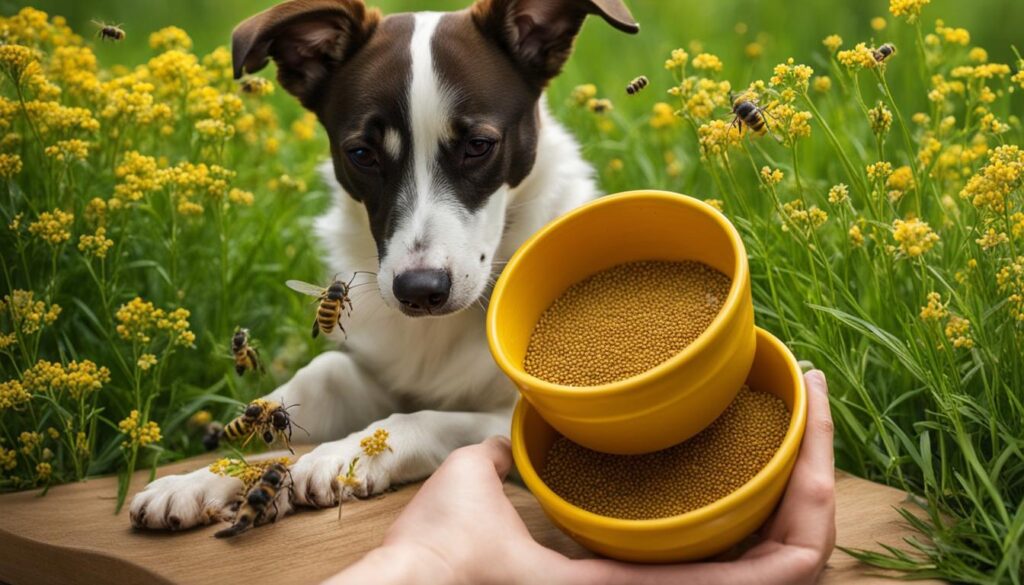
Caution when Giving Bee Pollen to Dogs
While bee pollen can offer potential benefits to dogs, it’s crucial to exercise caution when incorporating it into their diet. Keep the following points in mind:
- Start slowly and monitor your dog’s reaction.
- Consult with a veterinarian before giving bee pollen to your dog.
- Ensure the bee pollen is of high quality and free from contaminants.
- Discontinue use if any adverse reactions occur and seek veterinary advice.
By approaching the introduction of bee pollen with care and vigilance, you can help keep your furry friend safe and potentially harness the natural benefits of this supplement.
Best Practices and Safety Measures for Feeding Bee Pollen to Dogs
When it comes to giving bee pollen to dogs, there are important safety measures and best practices to keep in mind. While bee pollen can provide numerous health benefits for dogs, it’s crucial to ensure that it is sourced from reputable sources and given in appropriate dosages. Here are some guidelines to follow:
- Source High-Quality Bee Pollen: It is essential to choose high-quality bee pollen that is free from contaminants and toxins. Look for reputable suppliers that prioritize the purity and quality of their products.
- Start with Small Amounts: Begin by introducing bee pollen to your dog’s diet with small amounts. This allows you to monitor their response and ensure that they tolerate it well.
- Gradually Increase the Dosage: Once you have established that your dog tolerates bee pollen, you can gradually increase the dosage. It is recommended to follow a dosage guide and give approximately 1 teaspoon of bee pollen for every 50 pounds of body weight. However, always pay attention to your dog’s individual needs and consult with a veterinarian if necessary.
- Monitor for Adverse Reactions: It’s important to closely observe your dog for any adverse reactions after giving them bee pollen. Look for signs such as digestive upset, allergies, or changes in behavior. If you notice any negative effects, discontinue use and consult with a veterinarian.
- Consult with a Veterinarian: If you are unsure about giving bee pollen to your dog or have any concerns, it’s always best to consult with a veterinarian. They can provide personalized advice based on your dog’s specific health needs.
Remember, bee pollen is a supplement and should not replace a balanced diet or veterinary care. It is meant to be used as an additional support for your dog’s overall health and well-being. By following these safety measures and best practices, you can ensure that your dog can safely enjoy the benefits of bee pollen.
Table: Potential Adverse Reactions to Bee Pollen in Dogs
| Symptoms | Possible Causes |
|---|---|
| Upset stomach, diarrhea | Intolerance or sensitivity to bee pollen |
| Allergic reactions | Allergy to bee pollen or other ingredients |
| Behavioral changes | Individual sensitivity or reaction |
Bee Pollen for Allergy Protection in Dogs
When it comes to allergies in dogs, bee pollen can be a natural solution. With its antihistamine properties, bee pollen can help reduce allergy symptoms and alleviate discomfort in dogs. Regular consumption of bee pollen may even help desensitize dogs to specific allergens, providing long-term relief.
Bee pollen acts as a natural antihistamine, which means it can help counteract the effects of allergens in dogs. It works by inhibiting histamine release, reducing inflammation, and alleviating itching and discomfort. By incorporating bee pollen into your dog’s diet, you can help minimize the allergic response and improve their overall well-being.
“Bee pollen’s natural antihistamine properties make it an excellent choice for dogs with allergies. It can help reduce itching, inflammation, and other allergy symptoms, providing relief for our furry friends.” – Dr. Emily Thompson, DVM
It’s important to note that while bee pollen can offer allergy protection, it’s essential to source high-quality, toxin-free bee pollen from reputable suppliers. Additionally, consult your veterinarian before introducing any new supplements into your dog’s diet. They can provide guidance on dosage and monitor your dog’s progress to ensure they are receiving the right amount for their needs.
In conclusion, bee pollen can be a valuable tool in managing allergies in dogs. Its natural antihistamine properties can help reduce allergy symptoms, providing relief and improving the overall quality of life for allergic pets. However, always consult with your veterinarian and follow their instructions for safe and appropriate use of bee pollen for your furry companion.

Bee Pollen for Overall Health in Dogs
Bee pollen offers numerous benefits for the overall health of dogs. Its nutrient-rich composition supports various bodily functions, including immune health, liver function, wound healing, and more. Incorporating bee pollen into a dog’s diet can contribute to their overall well-being and vitality.
When it comes to immune health, bee pollen provides essential vitamins, minerals, and antioxidants that strengthen the immune system. The antioxidants help combat harmful free radicals and boost the body’s natural defense mechanisms, resulting in improved immune function and a healthier dog.
Furthermore, bee pollen can support liver function in dogs. It contains enzymes and nutrients that aid in detoxification, promoting a healthy liver and optimal organ functioning. Regular consumption of bee pollen can assist in maintaining a healthy liver and ensuring proper metabolic processes.
In addition, bee pollen has been found to have wound-healing properties. Its natural antimicrobial and anti-inflammatory properties can help promote the healing of wounds in dogs, preventing infection and reducing inflammation. By applying bee pollen topically or incorporating it into the diet, dog owners can support the recovery process of wounds and injuries.
Table: Comparison of Bee Pollen Benefits for Dogs
| Benefit | Description |
|---|---|
| Immune Health | Bee pollen provides essential vitamins, minerals, and antioxidants that strengthen the immune system and improve overall immune health in dogs. |
| Liver Function | The enzymes and nutrients present in bee pollen support liver function and aid in detoxification, promoting a healthy liver in dogs. |
| Wound Healing | Bee pollen’s natural antimicrobial and anti-inflammatory properties can help promote the healing of wounds in dogs, preventing infection and reducing inflammation. |
These are just a few examples of how bee pollen can benefit the overall health of dogs. However, it’s important to remember that bee pollen should be introduced gradually and in consultation with a veterinarian. Each dog is unique, and it’s essential to monitor their response to bee pollen and adjust the dosage accordingly for optimal results.
Giving Bee Pollen to Dogs with Sinus Problems
Bee pollen may offer potential benefits for dogs with sinus problems or respiratory issues. Its immune-balancing properties and nutrient-rich profile can help support respiratory health and reduce inflammation in the sinuses. While further research is needed to fully understand the extent of its effects, bee pollen’s natural compounds make it an intriguing option for managing sinus-related concerns in dogs.
When giving bee pollen to dogs with sinus problems, it’s important to follow certain guidelines. Start by sourcing high-quality, toxin-free bee pollen from reputable sources. Introduce bee pollen slowly and in small amounts, gradually increasing the dosage over time. This allows the dog’s system to acclimate and reduces the risk of adverse reactions. Monitoring the dog closely for any signs of discomfort or allergies is crucial.
It’s worth noting that bee pollen is not a substitute for professional veterinary care. If a dog has severe or chronic sinus issues, consulting with a veterinarian is essential for a comprehensive treatment plan. Veterinarians can provide tailored advice based on the dog’s specific needs and medical history.
In summary, bee pollen shows promise as a potential natural support for dogs with sinus problems. Its immune-balancing properties and nutrient content may aid in respiratory health and alleviating inflammation. However, it’s important to approach bee pollen as a supplement, not a standalone solution, and consult with a veterinarian for guidance specific to the dog’s condition.
Conclusion
In conclusion, bee pollen can be safely consumed by dogs and offers numerous health benefits. With its complete nutrient profile, including vitamins, minerals, proteins, and fats, bee pollen supports a dog’s energy needs, digestion, muscle strength, and immune health. It contains antioxidants that help fight infections and reduce inflammation, and it also aids in liver function and wound recovery.
When introducing bee pollen to dogs, it is important to start with a small dose and gradually increase it while monitoring for any adverse reactions. While bee pollen can be a natural and beneficial supplement for dogs, it should not replace a balanced diet and veterinary care. It is recommended to source high-quality, toxin-free bee pollen and consult a veterinarian if needed.
In summary, bee pollen provides a safe and effective way to enhance a dog’s overall health. Its benefits extend to energy, digestion, immunity, and respiratory health. By incorporating bee pollen into a dog’s diet, owners can support their furry friends’ well-being and promote a healthier lifestyle. However, it’s crucial to prioritize the individual needs and health conditions of each dog and make informed decisions regarding the appropriate dosage and usage of bee pollen.
FAQ
Can dogs safely consume bee pollen?
Yes, bee pollen can be safely consumed by dogs and offers numerous health benefits.
What is bee pollen?
Bee pollen is a mixture of pollen, nectar, and bee saliva collected by worker bees and used to feed the colony.
What are the health benefits of bee pollen for dogs?
Bee pollen can support a dog’s energy needs, digestion, muscle strength, and immune health. It contains antioxidants that help fight infections and reduce inflammation.
Can bee pollen help with allergies in dogs?
Yes, bee pollen has natural antihistamine properties that can reduce allergy symptoms and reactions in dogs. It may also help desensitize dogs to specific allergens.
How should I safely give bee pollen to dogs?
It is recommended to start with a small dose and gradually increase it while monitoring for any adverse reactions. Consult a veterinarian if needed.
What are the best practices and safety measures for giving bee pollen to dogs?
It is important to source high-quality, toxin-free bee pollen and remember that bee pollen is a supplement and not a replacement for a balanced diet.
Can bee pollen help dogs with allergies?
Yes, bee pollen can be beneficial for dogs with allergies as its natural antihistamine properties can help reduce allergy symptoms and reactions.
How can bee pollen benefit overall health in dogs?
Bee pollen supports immune health, aids in liver function, improves wound healing, promotes healthy skin and coat, and provides natural anti-inflammatory and antimicrobial properties.
Can bee pollen help dogs with sinus problems?
Yes, bee pollen’s immune-balancing properties and nutrient profile can help support respiratory health and reduce inflammation in the sinuses.
Conclusion
Bee pollen is safe for dogs and offers numerous health benefits. It can be a natural and beneficial supplement, but it should not replace a balanced diet and veterinary care.

